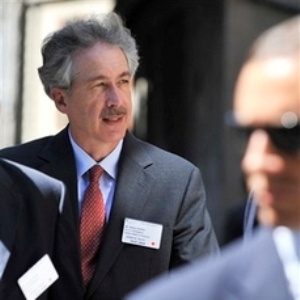U.S. New Move towards Iran
What is needed now is the change in the substance of the U.S. position towards Iran

When it was announced last week that the U.S. would send the Under-Secretary of State William Burns to Geneva for talks with Iran within the framework of 5+1, the reaction in the States and around the world was one of surprise because the U.S. had announced before that it would never sit down with Iranians unless Iran agreed to suspend its nuclear program.
There are several reasons for this shift in policy. While the U.S. called it a "smart step" sending a signal to the world and the Iranian government that it was committed to diplomacy, the main reason was something else: to join with other 5+1 members to make a united front with regard to the Iranian nuclear file. The U.S. wanted to show that it had taken every step in the negotiations and in the event of the collapse of the talks, it would attempt to push the Security Council to adopt new sanctions without facing serious obstacles. The new move might have also been designed to rebuff Obama’s criticism of U.S. policy towards Iran, indirectly helping John McCain in the presidential debates.
This new position was preceded by the reports that the U.S. was considering to open a diplomatic office in Iran. The news attracted more attention when Iran said that it would consider the idea positively if the U.S. officially requested it.
Furthermore, it was last month when the Chairman of Joint Chiefs of Staff, Admiral Mullen, said that any U.S. or Israeli attack against Iran would be destabilizing for the region.
These new U.S. moves are not limited to Iran. A few days ago, Bush talked about a "time horizon" for U.S. troops to withdraw from Iraq. Moreover, he approved the holding of six-party talks on North Korea with the participation of Secretary of State Rice.
All these changes are the results of the internal battle within the U.S. Administration between the neo-conservatives and realists on the direction of U.S. foreign policy. It appears that the realists, headed by Rice and Gates, have had the upper hand so far. However, the neo-conservatives have not been silent about these developments. Former U.S. Ambassador to the U.N., John Bolton, harshly criticized the new U.S. moves on North Korea and Iran recently.
In response, a White House spokesman called these moves "tactical". Has the U.S. spokesman wanted to diminish the pressure being put by the neo-conservatives on the Administration? Are these new moves really tactical or the U.S. has decided to change course and soften its positions with regard to these countries which were part of the axis of evil only a few years ago?
The passage of time will provide definite answers to these questions. However, as far as the case of Iran is concerned, one cannot see a real change in the U.S. attitude towards Iran. When it was said that Burns would participate in the Geneva talks, a U.S. official began a European tour to lobby U.S. allies not to do business with Iran. Around the same time, a bipartisan bill was discussed in the Senate Banking Committee to put more pressure on companies doing business with Iran. The bill authorizes divestment from companies that do business with Iran’s oil sector. And yesterday Admiral Mullen said that the international community needed to continue to put economic, financial, diplomatic and political pressure on Iran.
The Geneva meeting which lasted for a few hours was not conclusive. Both Jalili and Solana considered the meeting as constructive. While Iran described the talks as a step forward, the U.S. position contained an element of threat in it. The State Department spokesman said in a statement that Iran needed to make a choice between cooperation and confrontation. It is reported that Iran was given two weeks to give an answer to the 5+1 package presented to it last month.
The U.S. has changed some tactics in its Iran policy. A change in tone is also evident. We have not heard much about the use of force against Iran recently. What is needed now is the change in the substance of the U.S. position towards Iran. While the recent 5+1 meeting with Iran was a welcome development, one has to allow this process to take its time to come to fruition. The introduction of threats and deadlines will be counter-productive. It is not rational to expect this issue to be solved over-night. Both sides should continue the talks with good intention and sincerity.

